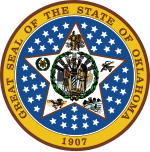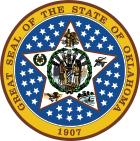56th Oklahoma Legislature
This article needs additional citations for verification. (August 2018) |
Oklahoma Legislature | |
|---|---|
| 56th Oklahoma Legislature | |
 Seal of Oklahoma | |
| Type | |
| Type | Bicameral |
| Houses | Senate House of Representatives |
Term limits | 12 years total |
| History | |
| Preceded by | 55th |
| Succeeded by | 57th |
New session started | January 3, 2017 |
| Leadership | |
President Pro Tem of the Senate | |
Speaker of the House | |
| Structure | |
| Seats | 48 Senate 101 House |
Senate political groups | Republican (40) Democrat (8) |
House political groups | Republican (75) Democrat (26) |
| Authority | Article V, Oklahoma Constitution |
| Salary | $38,400 |
| Elections | |
Senate last election | |
Senate next election | November 6, 2018 |
| Meeting place | |
 | |
| Oklahoma State Capitol Oklahoma City, Oklahoma | |
| Website | |
| Oklahoma Legislature | |
The Fifty-sixth Oklahoma Legislature was the most recent meeting of the legislative branch of the government of Oklahoma, composed of the Senate and the House of Representatives. It met in Oklahoma City, Oklahoma from January 3, 2017, to January 3, 2019, during the final two years of the second administration of Governor Mary Fallin. The November 2016 elections maintained Republican control of both the House and Senate.
Dates of sessions[]
- Organizational day: January 3, 2017
- First session: February 2-May 22, 2017
- First extraordinary session: September 25, 2017
- Second extraordinary session: December 18, 2017
- Second session: February 5-May 25, 2018
Previous: 55th Legislature • Next: 57th Legislature
Major legislation[]
 |
|---|
|
2017 Legislative Session[]
- Criminal Justice - SB603 mandates the Oklahoma Department of Corrections to create individualized case plans for each offender
- Education - HB1693 revised Oklahoma's A-F school grading system to comply with federal law
- Education - SB301 expands the Lindsey Nicole Henry Scholarship program
- Public Health - HB1703 expands pregnancy resource centers
- Public Health - HB2039 authorizes prescriptions of Naloxone to combat state's opioid crisis
- Taxation - SB845 raises the state tax on cigarettes by $1.50 per pack to $2.53 per pack
- Taxation - HB2433 raises the state tax on motor vehicle by extending a portion of state sales tax to include motor vehicle purchases
- Drivers License - HB1845 brings Oklahoma into compliance with the federal REAL ID Act
- Drivers License - SB643 eliminates Oklahoma's administrative hearing procedure for revocation of drivers licenses
- Crime and Punishment - HB1468 expands time limits for prosecution of sex crimes against children
- Taxation - HB2298 eliminates tax credits for wind industry
- Energy - SB867 expand ability for oil companies to conduct horizontal drilling
- Tourism - SB872 transfer ownership of the American Indian Cultural Center and Museum from the state to the city of Oklahoma City
- Taxation - SB120 extends tax credits for aerospace industry
2017 First Special Session[]
Following the Oklahoma Supreme Court ruling the tax increases found in SB845 unconstitutional, Governor Mary Fallin issued Executive Order 2017-29, later amended by subsequent order, to convene a special meeting of the Oklahoma Legislature. Pursuant to Section 7 of Article VI of the Oklahoma Constitution, the Governor recommended the Legislature adopt the following matters:
- Address the budget shortfall associated with the loss of revenue from the unconstitutionality of SB845
- Increase pay for public teachers
- Increase pay for public employees
- Provide supplemental funding for the Oklahoma State Department of Health
2017 Second Special Session[]
Following her veto of the amended fiscal year 2018 Oklahoma state budget, Governor Mary Fallin issued Executive Order 2017-43,[1] later amended by subsequent order[2] and again by an additional subsequent order,[3] to convene a special meeting of the Oklahoma Legislature. Pursuant to Section 7 of Article VI of the Oklahoma Constitution, the Governor recommended the Legislature:
- Provided supplemental funding for the Oklahoma Health Care Authority
- Adopt wide-ranging tax increases and elimination of tax deductions and credits
- Authorize expanded gambling by Native American tribes
- Grant the Governor greater appointment powers over Executive agencies
- Increase pay for public teachers
2018 Legislative Session[]
Subsequent Events[]
- On August 10, 2017, the Oklahoma Supreme Court, in the case of Naifeh v. Oklahoma ex rel Oklahoma Tax Commission, ruled 7-2 that SB845 violated the Oklahoma Constitution's tax raising clause by failing to obtain the super-majority of votes in the Legislature needed to raise taxes. SB845 had sought to raise the tax on cigarettes in an attempt to balance the fiscal year 2018 Oklahoma state budget. The Legislature had classified the measure as a "fee" as opposed to a "tax" but the Court disagreed with such classified. Without the revenues from the bill, the state budget lost over $200 million in anticipated revenue, forcing Governor Mary Fallin to convene an extraordinary session of the Legislature to revise the budget.
- On August 31, 2017, the Oklahoma Supreme Court, in the case of Oklahoma Automobile Dealers Association v. Oklahoma ex rel Oklahoma Tax Commission, ruled 5-4 that HB2433 did not violate the Oklahoma Constitution's tax raising clause. HB2433 eliminated an exemption under the current state sales tax code which excluded motor vehicle purchases from the tax. By removing the exemption, the Legislature did not raise a tax for the purposes of the Constitution's tax raising clause and therefore was not required to obtain the super-majority of votes in the Legislature needed to raise taxes.
- On December 19, 2017, the Oklahoma Supreme Court, in the case of Hunsucher v. Fallin, ruled 5-4 that SB643 unconstitutional under the Oklahoma Constitution's single-subject clause and Due Process Clause. SB643 eliminated Oklahoma's administrative hearings procedures for revocation of drivers licenses and allowed the Oklahoma Department of Public Safety to revoke the license without granting the affected driver a hearing before the Department or an administrative opportunity to object.
Leadership[]

Since the Republican Party holds the majority of seats in both the Oklahoma Senate and Oklahoma House of Representatives, they hold the top leadership positions in both chambers.
In Oklahoma, the lieutenant governor serves as President of the Oklahoma Senate, meaning that he serves as the presiding officer in ceremonial instances and can provide a tie-breaking vote. Todd Lamb serves as the current Lieutenant Governor of Oklahoma. The current President pro tempore of the Oklahoma Senate, who presides over the state senate on the majority of session days is Mike Schulz of Altus. He is aided by Majority Floor Leader Greg Treat of Oklahoma City. The Democratic minority leader of the state senate is John Sparks of Norman. Paul Ziriax serves as the Secretary of the Oklahoma Senate.
The Oklahoma House of Representatives is led by Speaker Charles McCall of Atoka. He is aided by Majority Floor Leader Jon Echols of Oklahoma City. The Democratic minority leader is Steve Kouplen of Beggs. Joel Kintsel serves as Chief Clerk of the Oklahoma House of Representatives.
Membership[]
Senate[]
| 40 | 8 | |
| Republican | Democrat | |
| Affiliation | Party (Shading indicates majority caucus)
|
Total | |
|---|---|---|---|
| Republican | Democratic | ||
| End of previous legislature | 38 | 10 | 48 |
| Begin | 40 | 8 | 48 |
| Latest voting share | 83% | 17% | |
House[]
| 75 | 26 | |
| Republican | Democrat | |
| Affiliation | Party (Shading indicates majority caucus)
|
Total | |
|---|---|---|---|
| Republican | Democratic | ||
| End of previous legislature | 71 | 30 | 101 |
| Begin | 75 | 26 | 101 |
| Latest voting share | 74% | 26% | |
References[]
- ^ "1791.pdf" (PDF).
- ^ "1799.pdf" (PDF).
- ^ "1803.pdf" (PDF).
External links[]
- Oklahoma legislative sessions
- 2017 in Oklahoma
- 2018 in Oklahoma
- 2017 U.S. legislative sessions
- 2018 U.S. legislative sessions